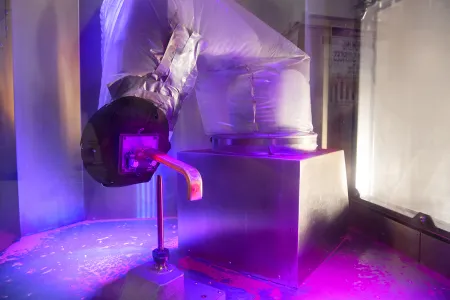News Article
Engineering a solution to help fight COVID-19
Charles Darwin University has partnered with technology developer SPEE3D to use 3D printing technology to coat door handles with copper in high traffic areas as a possible solution to help reduce the viability of viruses such as COVID-19.
CDU Director of Research and Innovation Dr Steve Rogers said that items covered in copper could reduce the survival of the virus potentially reducing transmission.
“Studies have shown that copper is an effective antimicrobial material,” Dr Rogers said.
The process, known as ACTIVAT3D copper, has been developed by modifying SPEE3D’s 3D printing technology, using new algorithms for controlling their metal printers to allow existing metal parts to be coated with copper.
Australian NATA accredited clinical trial speciality laboratory, 360Biolabs, tested the effect of ACTIVAT3D copper on live SARS-CoV-2 in their Physical Containment 3 (PC3) laboratory. The results have shown that touch surfaces modified by this process “contact kills” 96% of SARSCoV-2, the virus that causes COVID-19, in just two hours.
SPEE3D worked in collaboration with the Advanced Manufacturing Alliance (AMA) at CDU to conduct the initial trial to coat a touch plate and door handle on its Casuarina campus in Darwin, Australia. The SPEE3D team developed a process to coat a stainless-steel door touch plate and other handles in just 5 minutes.
Dr Rogers said the results were promising and he was excited that this innovative technology could help reduce the survival of the virus on high traffic surfaces.
“Using the LightSPEE3D 3D printer on our campus, the SPEE3D team have trialled this innovative engineering solution,” Dr Rogers said. “Working with our facilities staff they installed the first door plate on one of our buildings in late March. The results suggest that it is possible to copper coat further items using the LightSPEE3D machine to help reduce the survival of the virus on surfaces.”
CDU partnered with SPEE3D to form the AMA, a joint initiative to use a world-first 3D metal printing technology.
The alliance will aim to engage with industry partners, trades and academics to develop real-world applications, create industry procedures and standards and drive material development.
For more information about the ACTIVAT3D process and the 360Biolabs test results visit W: spee3d.com/resources.
Related Articles

First “hype cycle” of AI development put tech above humans
Users around the world have rushed to adopt artificial intelligence - especially in safety-critical fields - but a new study has revealed the hype has prioritised technology for technology’s sake instead of human-centred development.
Read more about First “hype cycle” of AI development put tech above humans
Nanoplastics hindering cognitive abilities of fish, international research shows
Nanoplastic exposure can impair the cognitive abilities of fish and could lead to significant impacts on marine species’ ability to survive, according to a new international study.
Read more about Nanoplastics hindering cognitive abilities of fish, international research shows
New project to grow Indigenous aquaculture on one of Australia’s largest islands
An Australian island’s efforts to improve food security and transition into a blue economy will be bolstered by a new project to propagate a nutritious and increasingly popular fish.
Read more about New project to grow Indigenous aquaculture on one of Australia’s largest islands
